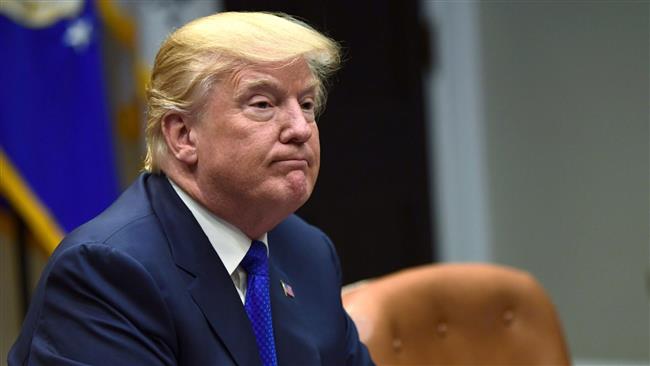US: Trump says wants Iran ‘back at the table’ after tanker attacks
US President Donald Trump has said that he wants Iran to get back at the table, following attacks on two oil tankers in the Sea of Oman which Washington has blamed on Tehran.
In an interview on Fox News on Friday, Trump blamed Iran for the attack on oil tankers without providing any solid evidence, as did his secretary of state, Mike Pompeo, a day before.
A day after the incident, Iran warned the US to stop playing a blame game through “suspicious” attacks on oil tankers in the Middle East, describing the American behavior as “worrying”.
Trump said on Friday that if Iran were to close the Strait of Hormuz, “it’s not going to be closed for long,” without elaborating how the United States would keep the international shipping route open.
“They’re not going to be closing [the strait],” Trump said in response to a hypothetical question from Fox News.
“They know it, and they’ve been told in very strong terms. We want to get them back at the table, if they want to go back,” he said.
“I’m ready when they are, but whenever they’re ready, it’s okay. And in the meantime, I’m in no rush. I’m in no rush,” he added.
Leader of the Islamic Revolution Ayatollah Seyyed Ali Khamenei on Thursday dismissed Trump as a person not worthy of a response or a message, stressing that negotiations with Washington cannot help solve any problem.
Ayatollah Khamenei made the remarks in a meeting with Japanese Prime Minister Shinzo Abe, who told the Leader he was carrying a message from the US president.
“We have no doubts about your (Japan’s) goodwill and seriousness, but regarding what you quoted from the US president, I personally do not consider Trump worthy of exchanging any messages with, and do not have and will not have any response for him,” the Leader told Abe.
The Leader said Iran has “no trust” in the United States and will not at all “repeat the bitter experience” it gained from the negotiations that led to the conclusion of a 2015 nuclear deal, which Washington later ditched.
Earlier this year, Iran said it would close the strait in response to a US decision to end waivers for companies that export oil from the Islamic Republic.
The top commander of the Islamic Revolution Guards Corps (IRGC)’s Navy said on April 22 the Strait of Hormuz is an international maritime passage, and warned that Iran may close the strategic waterway if prevented from using it.
“According to international law, the Strait of Hormuz is a waterway and we will close it [to other countries] in case we are banned from using it,” IRGC Navy Commander Rear Admiral Alireza Tangsiri said.
“In case of any threat, we will not hesitate to support and defend Iran’s waters. We will defend our honor and will take reciprocal measures when it comes to protecting Iran’s rights,” he added.







